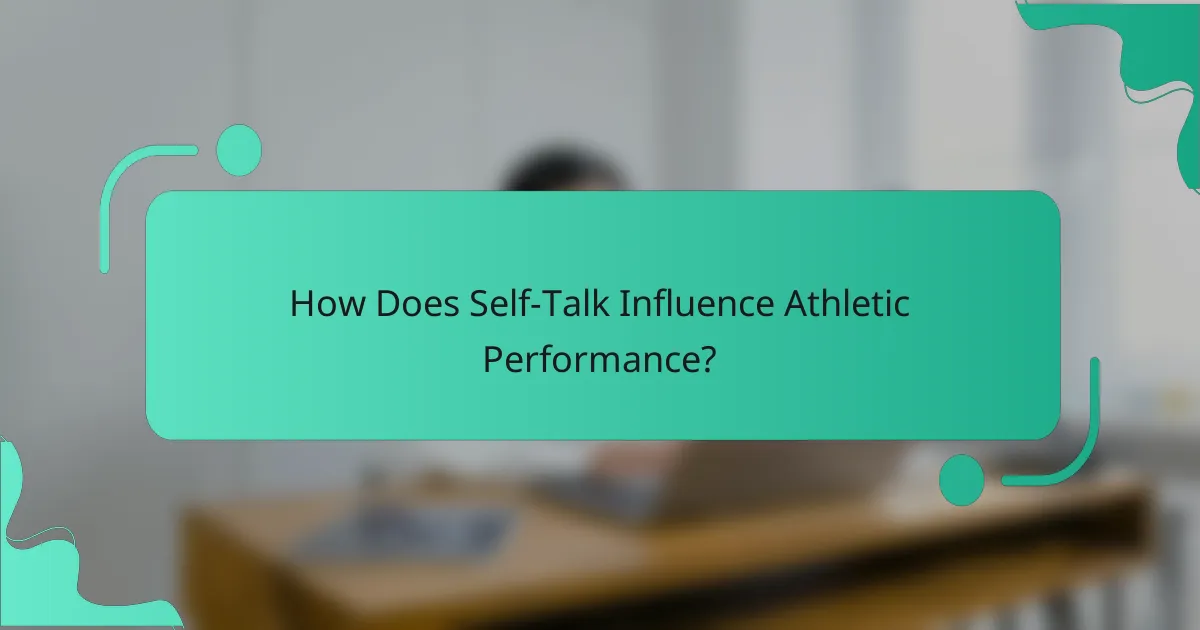Self-talk significantly boosts athletic performance by enhancing confidence, focus, and resilience in professional athletes. Positive self-talk fosters a growth mindset and helps overcome challenges. Research shows that constructive self-talk leads to improved performance metrics, including reaction times and decision-making skills. Additionally, it can reduce anxiety, enabling athletes to thrive under pressure.

How Does Self-Talk Influence Athletic Performance?
Self-talk significantly boosts athletic performance by enhancing confidence, focus, and resilience among professional athletes. Positive self-talk fosters a growth mindset, enabling athletes to overcome challenges and maintain motivation. Research indicates that athletes who engage in constructive self-talk experience improved performance metrics, such as faster reaction times and better decision-making skills. Additionally, self-talk can mitigate anxiety, allowing athletes to perform under pressure. By incorporating specific phrases and affirmations, athletes can reinforce their mental strength and adaptability in competitive environments.
What Are the Key Benefits of Positive Self-Talk?
Positive self-talk significantly enhances performance by boosting confidence, focus, and resilience in pro athletes. It fosters a positive mindset that can lead to improved outcomes during competitions. Studies show that athletes who engage in positive self-talk experience reduced anxiety levels and increased motivation. This practice helps them maintain concentration under pressure, enabling better decision-making and execution of skills. Furthermore, positive self-talk can enhance recovery from setbacks, promoting resilience in facing challenges. Ultimately, it serves as a powerful tool for achieving peak performance.
How Does Self-Talk Enhance Confidence in Athletes?
Self-talk significantly enhances confidence in athletes by fostering a positive mindset and reinforcing self-belief. It helps athletes maintain focus during competitions and recover from setbacks. Research shows that athletes who engage in positive self-talk exhibit improved performance metrics, such as increased endurance and skill execution. This practice cultivates resilience, enabling athletes to cope with pressure and challenges effectively. By integrating self-talk strategies, athletes can transform their mental approach, leading to more consistent and confident performances.
What Techniques Can Athletes Use to Foster Positive Self-Talk?
Athletes can foster positive self-talk through techniques such as affirmations, visualization, and reframing negative thoughts. Affirmations involve repeating positive statements to boost confidence. Visualization helps athletes imagine successful performances, enhancing focus and mental preparation. Reframing negative thoughts transforms them into constructive insights, promoting resilience and a growth mindset. These techniques collectively improve performance by reinforcing a positive mental state.
In What Ways Does Self-Talk Improve Focus During Competition?
Self-talk enhances focus during competition by fostering a positive mindset and reducing distractions. It helps athletes maintain concentration on their performance rather than external pressures. Research indicates that self-talk can improve attention control, enabling athletes to stay engaged in their tasks. Additionally, using specific phrases can reinforce confidence, which is crucial for peak performance. Athletes who practice effective self-talk demonstrate increased resilience, allowing them to recover quickly from setbacks during competitions.
What Strategies Help Maintain Focus Through Self-Talk?
Positive self-talk enhances focus by reinforcing confidence and resilience in athletes. Techniques include affirmations, visualization, and goal-setting. Affirmations involve repeating positive statements to combat negative thoughts. Visualization helps athletes mentally rehearse successful performance, increasing focus. Goal-setting provides clear objectives, guiding attention and motivation. As a result, these strategies create a mental environment conducive to peak performance.
How Can Self-Talk Build Resilience in High-Pressure Situations?
Self-talk enhances resilience in high-pressure situations by fostering a positive mindset and improving focus. Athletes who engage in constructive self-talk report increased confidence and better performance outcomes. Research shows that positive affirmations can reduce anxiety, allowing for clearer decision-making during critical moments. This mental strategy acts as a unique attribute of elite athletes, enabling them to thrive under pressure.
What Are Effective Self-Talk Phrases for Resilience?
Effective self-talk phrases for resilience include “I can handle this challenge,” “Every setback is a setup for a comeback,” and “I am capable of achieving my goals.” These phrases boost confidence and focus, essential for pro athletes. Research shows that positive self-talk enhances performance and mental resilience under pressure. By consistently using these affirmations, athletes can cultivate a resilient mindset, leading to improved outcomes in competitive environments.
What Unique Attributes of Self-Talk Set Successful Athletes Apart?
Successful athletes leverage unique attributes of self-talk to enhance their performance. These attributes include personalized affirmations, strategic focus techniques, and resilience-building phrases. Personalized affirmations boost self-confidence by reinforcing belief in abilities. Strategic focus techniques help athletes concentrate on specific goals, minimizing distractions. Resilience-building phrases enable athletes to cope with setbacks, fostering a growth mindset. Collectively, these unique attributes differentiate high-performing athletes by creating a mental framework that supports optimal performance.
How Do High-Performing Athletes Utilize Self-Talk Differently?
High-performing athletes utilize self-talk to enhance their performance by boosting confidence, focus, and resilience. They engage in positive affirmations and constructive dialogue, which fosters a growth mindset.
Research indicates that athletes who practice self-talk effectively report improved concentration and reduced anxiety. For instance, a study found that athletes using motivational self-talk experienced a 10% increase in performance metrics.
Unique attributes of high-performing athletes include tailored self-talk strategies that align with their specific goals and challenges. They often use visualization techniques alongside self-talk to reinforce their mental preparation.
As a result, these athletes demonstrate greater resilience in high-pressure situations, allowing them to maintain composure and execute their skills effectively. This strategic use of self-talk is a key differentiator in their training and competitive success.
What Rare but Impactful Self-Talk Practices Exist Among Elite Athletes?
Elite athletes utilize rare self-talk practices to enhance performance by boosting confidence, focus, and resilience. Techniques such as visualization combined with affirmations are impactful. For instance, athletes often create vivid mental images of success while repeating positive statements. This dual approach reinforces belief in their abilities. Additionally, some elite performers engage in self-reflection, analyzing past performances to extract lessons and motivate future efforts. Such practices not only improve mental toughness but also foster a growth mindset, critical for overcoming challenges.
What Lessons Can Be Learned from Top Performers’ Self-Talk?
Top performers use self-talk to enhance confidence, focus, and resilience. Effective self-talk strategies include positive affirmations, goal-oriented phrases, and mindfulness techniques. Research indicates that athletes who practice constructive self-talk experience improved performance metrics and mental clarity. For instance, a study found that self-affirmation can increase resilience in high-pressure situations, allowing athletes to maintain composure and focus.
How Can Athletes Avoid Common Mistakes in Self-Talk?
Athletes can avoid common mistakes in self-talk by cultivating positive and constructive inner dialogue. Focus on affirmations, visualize success, and practice mindfulness to enhance confidence and resilience.
Negative self-talk often leads to decreased performance, while positive self-talk boosts focus and motivation. Regularly challenge and reframe negative thoughts, replacing them with empowering statements. A unique attribute of effective self-talk is its ability to create a mental environment conducive to peak performance.
Additionally, athletes should engage in self-reflection after competitions to identify thought patterns that may hinder performance. This practice helps in developing a more supportive internal dialogue over time.
What Best Practices Should Athletes Implement for Effective Self-Talk?
Athletes should implement positive self-talk techniques to enhance performance. This includes using affirmations, visualizing success, and reframing negative thoughts. Positive self-talk boosts confidence, sharpens focus, and fosters resilience during competition. Research indicates that athletes who practice effective self-talk experience improved outcomes and mental clarity. For example, studies show that self-affirmation can increase motivation and reduce anxiety. Incorporating these practices into daily training can significantly impact an athlete’s overall performance.
How Can Self-Talk Be Integrated into Daily Training Regimens?
Self-talk can be effectively integrated into daily training regimens by establishing specific routines and techniques. Athletes can practice positive affirmations before workouts to enhance confidence. Incorporating self-talk during exercises helps maintain focus and boosts resilience against challenges. Regularly evaluating and adjusting self-talk strategies ensures they align with performance goals. This approach fosters a consistent mental framework that drives improvement.
